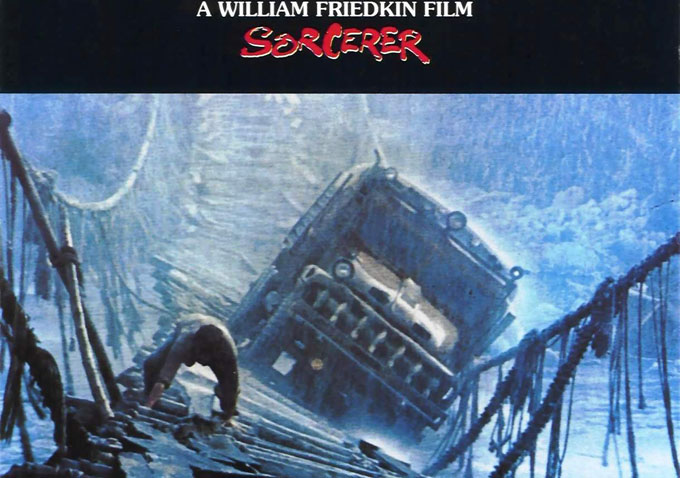By
Stephen Prather
In 1971, William Friedkin’s film The French Connection became the first rated R movie to win the Oscar for Best Picture; the movie also won Best Director, Best Actor, Best Adapted Screenplay, and Best Film Editing in a massive sweep. Following this with The Excorcist, he solidified himself as a massive new force in Hollywood. His next film was originally planned as a small budget side project to bide his time before filming a sequel to The Exorcist, called The Devil’s Triangle. The journey of making Sorcerer led to the budget expanding from $2.5 million to $22 million, Friedkin believing Sorcerer would be his magnum opus.
Experimental, newly electronic krautrock group Tangerine Dream created the ambient, foreboding, and innovative soundtrack. It provides the grandiose, claustrophobic, awe-inspiring auditory backdrop to a subversive story of a terrorist, a mobster, a corrupt banker, and an assassin embarking on a mission of almost certain death purely for the money. Sorcerer stays in the school of realism (there is no magic or sorcerer in the movie), but the impending doom of the universe is painted perfectly by Tangerine Dream’s music, evoking the existential dread these dark characters face.
Sorcerer is both a microcosmic and reflexive example of a dramatic shift within Hollywood cinema. The Classic Hollywood of the 1950’s and early 60’s, notably featuring producer and studio-driven musicals and historic epics, began to lose financial viability in wake of the advent of television, and Hollywood needed a paradigm shift to attract the new college-educated, counterculture-sympathetic eye of the main moviegoing population. They achieved this by enlisting a roster of young, experimental auteurs the likes of Francis Ford Coppola, Martin Scorsese, Terrence Malick, Stanley Kubrick, and William Friedkin which took full control of their projects with little to no studio involvement. Their films relished in destabilizing the status quo, turning an artistic eye to the underreported dark side of humanity and the equally dark universe we live in.
This all changed in 1977, the year Sorcerer debuted, alongside a new sci-fi (or fantasy if you’re a purist) film by young director George Lucas. Star Wars shattered the box office, nearly doubling the overall profits of 20th Century Fox as a company. Sorcerer, on the other hand, made $9 million against a $22 million budget. Besides Star Wars bulldozing Sorcerer in comparison, Sorcerer had its own pitfalls marketing-wise. Because this was Friedkin’s first movie after The Exorcist, audiences (understandably so) thought it was some sort of magic or horror movie. It suffered from many walkouts due to this. The first 16 minutes of the movie are in foreign languages because they track the characters from all around the world. To be honest, I got about 10 minutes in before googling whether it was a foreign language film. All of these factors led to the financial disaster that apparently caused Friedkin to swear he would never work in the American film industry again. In a very different way, it seems to have broken him like Apocalypse Now broke Francis Ford Coppola as an ambitious auteur. At least Apocalypse Now made money.
Escapist film became vogue. They were easier to make and audiences loved them. The cynicism of the mid-seventies had worn off, still bitter about the fall of the counterculture movement, leading to the schlocky, glitzy vibe of the 80’s. Few of the New Hollywood directors maintained their same ambitious vision: Friedkin, Michael Cimino, and Terrence Malick fell into obscurity; Francis Ford Coppola severely reduced the scope his projects; and even Martin Scorsese took an odd, comedic turn through the mid-80’s. It is a shame, though, that Sorcerer was the largest casualty of this paradigm shift, and Friedkin along with it. Due to its subversive worldview, its experimental style, and its existential dread, it still doesn’t receive the adulation it should. It is one of the most overlooked masterpieces in film history.
Stephen Prather
I live in North Dallas with my dog, Arch, who is a total goober. I have been published in 34th Parallel and have written about music in A Gathering of the Tribes.



Great review! I really enjoyed reading this.